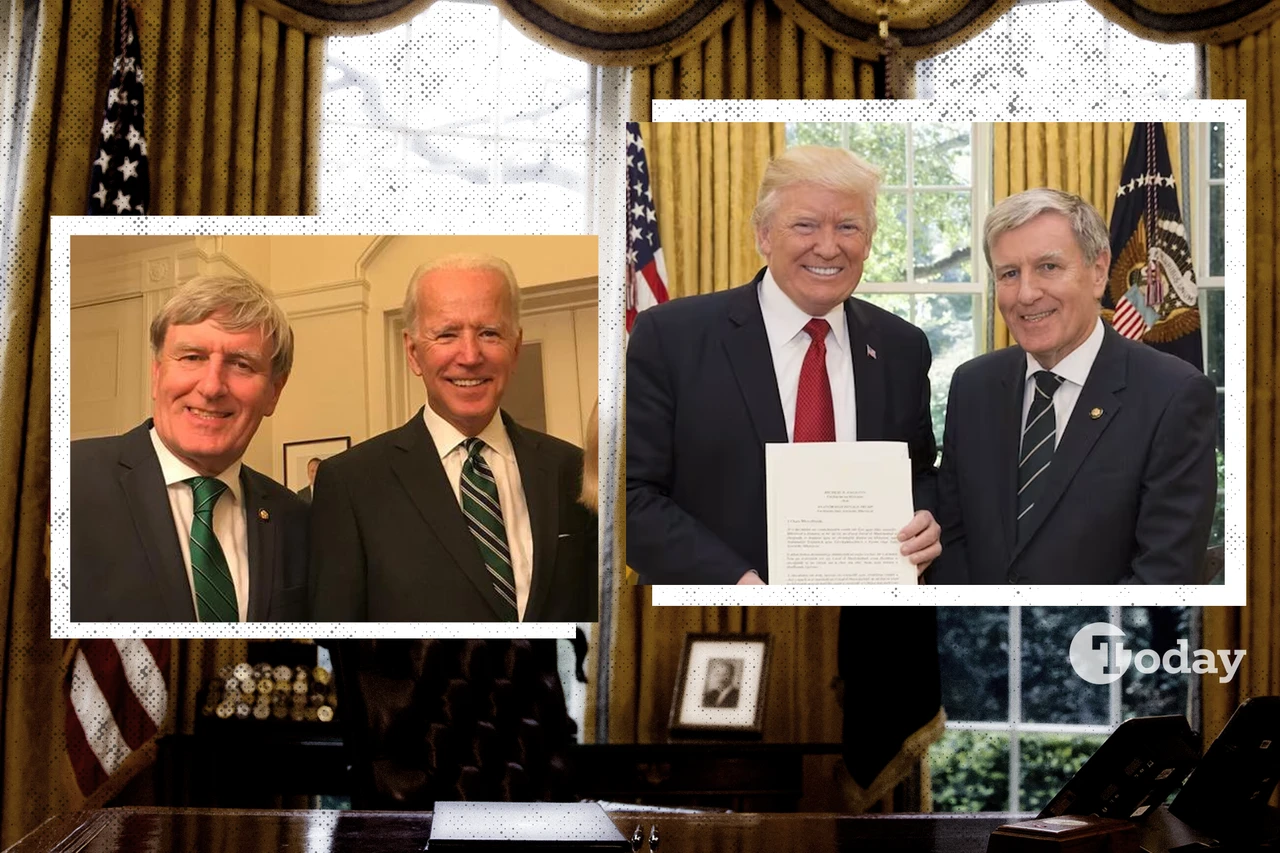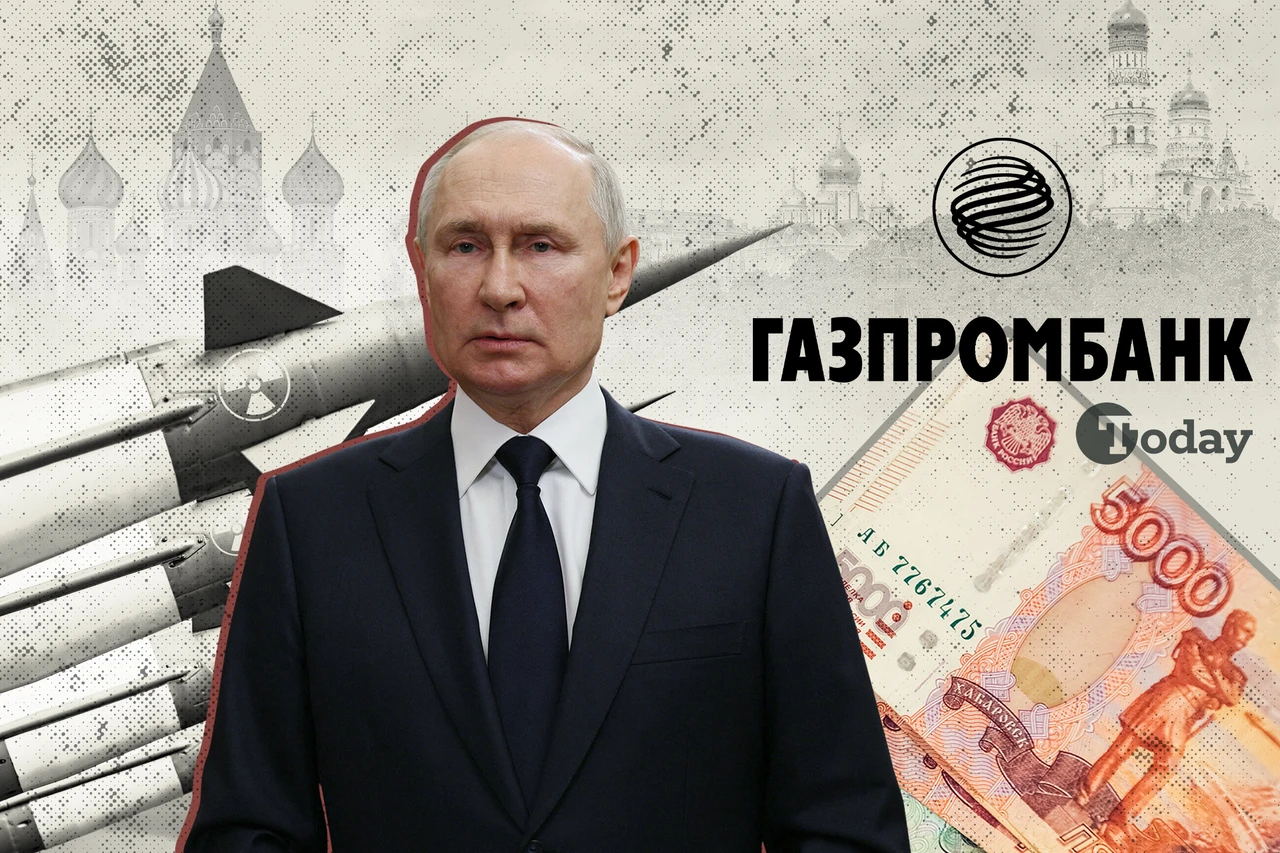Exclusive: Irish ambassador on US reputation, EU-US ties and Ireland’s elections
 Daniel Mulhall, Former Irish Ambassador to the US, with Pres. Biden on the left and Presiden-elect Trump on the right. (Collage prepared by Türkiye Today team)
Daniel Mulhall, Former Irish Ambassador to the US, with Pres. Biden on the left and Presiden-elect Trump on the right. (Collage prepared by Türkiye Today team)
A strong international reputation is crucial for nations in today’s interconnected world. For the United States, its declining global standing has become especially noticeable in strategic regions like the Middle East. In particular, the U.S. faces challenges to its credibility in addressing critical issues such as the Israel-Palestine conflict.
Meanwhile, competitors like Russia and China are gaining favor, a trend reflected in the annual Democracy Perception Index published by Denmark’s Democracy Research Center.
This decline has repercussions beyond geopolitics. A study by three professors from Drexel University’s Business School cautions that a damaged global reputation could jeopardize billions of dollars in U.S. exports.
In an exclusive conversation with Türkiye Today, a seasoned diplomat and former Irish ambassador who served under both the Trump and Biden administrations shared candid insights on the reputation trends of the US around the globe, evolving transatlantic relations, U.S. foreign policy, and the challenges posed by Trump’s potential return to the White House.
The ambassador, drawing on extensive diplomatic experience, is in favor of painting a more nuanced picture of the current political landscape, emphasizing that while Trump’s presidency may usher in uncertainty, it also opens doors for transactional diplomacy.
Polarization, America’s reputation around world
In discussing how U.S. domestic polarization impacts its international image, the former ambassador highlighted differing perspectives. “For many liberals in Europe, Trump’s victory was a step backward. However, there are Europeans who view Trump’s policies as the right approach and support similar movements in their own countries,” he said.
Mulhall stressed the need for pragmatic engagement: “There’s work to be done. We must find common ground and navigate the uncertainties ahead.”
He also called for patience in evaluating the Trump administration’s policies. “Campaign promises often don’t translate directly into actions. We will have to wait and see how his administration governs,” he noted.
Reflecting on Europe’s longstanding protests against U.S. foreign policy, the ambassador pointed out that recent criticism of American support for Israel fits into a broader historical trend.
“Anti-American sentiment has always been present across Europe, including in Ireland,” he explained.
“We’ve seen protests against everything from missile deployments during the Cold War to the Iraq War and now, large demonstrations against Israeli actions in Gaza,” he added.
Ukraine & EU-US relations
When asked about the alignment between the U.S. and the EU on critical global issues such as security, climate change and trade, the former ambassador was candid: “They are not aligned in principle on any of these areas.”
He acknowledged that despite European governments’ preference for a Democratic victory, they are already preparing to engage with a potential second Trump administration.
“European leaders had hoped for continuity under Harris or Biden, particularly regarding Ukraine and climate change. Trump’s return, however, would represent a significant shift, which is unsettling for America’s allies,” he said.
For the ambassador, the war in Ukraine remains the most urgent issue in US-EU relations. Trump’s claim that he could resolve the conflict “overnight” has raised concerns across Europe.
“If Trump manages to broker a resolution that benefits Ukraine and European security, he will receive praise. However, the fear is that he might push for a settlement that favors Russia—something that would be unacceptable for both Ukraine and the EU.”
The ambassador expressed particular concern about the potential for a unilateral settlement imposed by the U.S., which could destabilize European security.
“The worry is that Trump may prioritize a quick resolution over a fair one, leaving Ukraine and its neighbors vulnerable,” he explained.
He also noted the internal divisions within the Republican Party regarding Ukraine.
“While some Republicans may support Trump’s approach, many remain firmly opposed to Russia, which could prevent a clear victory for Putin.”
‘Trade Wars’ not just with China
The former ambassador flagged Donald Trump’s threats of tariffs on European exports as a potential point of tension in US-EU relations. “Tariffs would be disastrous for the EU economy, given the volume of goods exported to the US. Retaliatory measures could lead to a damaging trade war,” he warned.
However, he remained cautiously optimistic about the possibility of finding common ground, drawing from his experience in facilitating diplomacy with the Trump administration. “Trump is transactional, not ideological. The EU can craft a deal that he can present to his supporters as the ‘greatest trade deal ever,’” he said.
In concluding his remarks on the issue, the ambassador characterized Trump as a leader who prioritizes personal relationships and deal-making. “He sees himself as a negotiator first.
The EU should take advantage of this mindset to maintain stability in transatlantic relations. The goal for the next four years should be manageability, not idealism,” he stated.
The former ambassador also rejected pessimism about the future: “It can be managed,” he affirmed.
Gaza, Israel and US foreign policy
Regarding the Biden administration’s handling of the Gaza conflict, the former ambassador noted a shift in American sentiment toward Israel. “Support for Israel remains strong across both U.S. political parties, but Netanyahu’s actions during the Gaza crisis have raised concerns, particularly among Democrats,” he said.
The ambassador criticized Israel’s prolonged response to Hamas, stating, “Israel had the right to defend itself after Oct. 7, but the scale and duration of its response have crossed a line. Diplomacy could have prevented the extended violence.”
He also expressed disappointment over the lack of U.S. diplomatic pressure on Israel to agree to a cease-fire before the U.S. election, calling it a missed opportunity that could have benefited the Democrats politically.
Faces to diplomacy
As an ambassador of years of experience, Daniel Mulhall highlighted the powerful role of culture—through literature, music, film and dance—in bridging divides. He recalls examples where shared cultural interests can create an atmosphere for dialogue and erase ideological differences, such as an orchestra in Germany composed of Israeli and Palestinian musicians that he attended once.
For Mulhall, cultural diplomacy is more than just a tool of soft power; it is a profound way to tell a nation’s story and humanize its history and values. As a passionate advocate for Irish literature, he has consistently used the works of James Joyce and W.B. Yeats to share Ireland’s narrative with the world, demonstrating that cultural engagement can inspire empathy and mutual respect across diverse societies.
The Irish elections
After addressing global issues, the ambassador was asked about the upcoming elections in his home country, Ireland. He highlighted a global trend: the anti-incumbent wave. While incumbents worldwide are facing declining popularity, Ireland appears poised to defy this trend. Despite navigating crises, like the pandemic and inflation, the coalition government has maintained steady support.
There are a lot of ways that Ireland’s political environment stands out. With no far-right or populist parties gaining traction, this anomaly is not the single one. Ireland also has a parliamentary system that has one of the most independent deputies taking their seats.
Ambassador Mulhall notes that this localized political structure, paired with Ireland’s community-oriented culture, has played a key role in maintaining a stable democratic environment.
UK-Ireland relations and the question of unity
As one of the key ambassadors during the Brexit era, Mulhall played a significant role in jumping the barriers to that period. He notes that relations between the U.K. and Ireland, which were strained during the Brexit years, are now seeing an improvement under new leadership in Britain.
Ambassador Mulhall views this as an important reset, with recent diplomatic efforts signaling a clear commitment to rebuilding trust.
On the issue of Irish unification, Mulhall calls for patience, advocating for a careful, measured approach that prioritizes healing and greater mutual understanding between communities.
While he supports unification in principle, he emphasizes that any referendum should be preceded by extensive dialogue to ensure a well-considered and inclusive decision-making process, pointing to diplomatic dialogue channels relevant to his own work.



